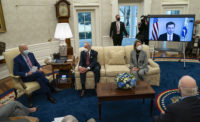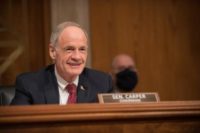
The search for a new transportation bill has passed a key milepost in the Senate Environment and Public Works Committee (EPW). Leaders agreed on a blueprint for the highway-policy portion of an eventual long-term measure. The bill could span six years with funding set at current levels, plus small hikes for inflation.
But the make-or-break issue is finding new revenue to attain the hoped-for higher funding. EPW Chairman Barbara Boxer (D-Calif.) pegs the need at $16 billion a year. But it will be up to the Senate Finance and House Ways and Means committees, not EPW, to find the money.
Industry officials agree financing is crucial but praised the April 10 announcement by the EPW "Big Four" on highway issues: Boxer; David Vitter (La.), the panel's top Republican; Thomas Carper (D-Del.), transportation and infrastructure subcommittee chairman; and John Barrasso (Wyo.), the subcommittee's ranking GOP member.
Steve Hall, American Council of Engineering Companies vice president for government affairs, says, "Obviously, having the Big Four together on a game plan going forward is absolutely critical. We need bipartisan cooperation in both houses if we're going to get this done this year." The current law, the Moving Ahead for Progress in the 21st Century Act, (MAP-21), lapses on Sept. 30.
Boxer says a consensus seems to be emerging to use "a piece of tax reform" to produce new highway revenue, maybe changes that spur companies to repatriate overseas profits. Carper, who also is on Finance, says the answer probably won't be one "silver bullet" but multiple sources—"silver BBs," as he calls them.
As Finance hunts for revenue and other committees draft transit and highway-safety parts of the package, EPW leaders plan to move quickly on their portion. Vitter says the Big Four expect to have their bill ready for a committee vote by late May. In the House, Transportation and Infrastructure Committee Chairman Bill Shuster (R-Pa.) has said he hopes to have a committee vote on a highway-transit bill in spring or summer.
Terry O'Sullivan, Laborers' International Union of North America general president, sees an "urgent need for action" on a bill. He points to the Highway Trust Fund, whose highway account is expected to post a deficit as early as July.
David Bauer, American Road & Transportation Builders Association senior vice president, notes two deadlines. He says if the trust fund isn't at least shored up by July, federal highway aid reimbursements to states will slow down.
If MAP-21 expires without a successor in place, the impact would be much worse. Bauer says, "What we have [on Sept. 30] if Congress doesn't act is … there is no new highway or public- transportation investment."




Post a comment to this article
Report Abusive Comment